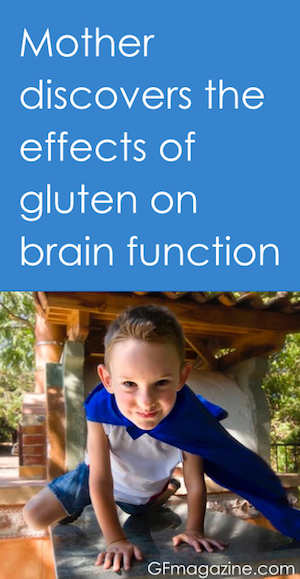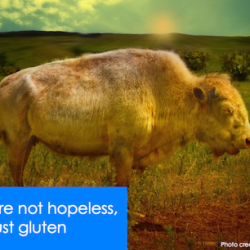
Six years ago “gluten” was yet to be a regular part of my vocabulary.
I didn’t even know the meaning of the word.
I also knew very little about the brain disorder, autism.
Today, they are an intricate part of my everyday life.
They are the main threads that weave the tapestry of my day.
There are many days I think I know way more about intestinal permeability (AKA leaky gut), gliadorphin and casomorphin than I’d like to but I am thankful I do because this knowledge transformed my life and changed the course of my son’s.
Six years ago. I was obese, depressed, anxious, suffering with insomnia, night terrors, asthma, heightened allergies, digestive issues (including heartburn, indigestion, gas, bloating and inconsistent bowel movements), various skin issues, chronic body pain (I had been diagnosed with arthritis) and the list goes on.
I knew something needed to change. I had been prescribed anti-depressant and anxiety medications as well as a mild tranquilizer at one time for Irritable Bowel Syndrome. I also took allergy and asthma medications on a daily basis and popped ibuprofen like candy.
One day while reading a magazine, I ran across an article written by Dr. Mark Hyman on an elimination diet. The fact that I had all the symptoms listed in the ad caught my attention and I decided to order his book, The Ultra Simple Diet. I’m not sure what came over me but I read the book overnight and jumped feet first into this new lifestyle.
What happened next was transformational.
Change your diet…change your life
An elimination diet consists of removing potentially inflammatory foods from one’s diet. I started with the top five: gluten, dairy, soy, eggs, almost all process foods, and chemicals (pesticides, preservatives, etc.). I ate only organic fruits and vegetables, lean/clean protein and some non-gluten grains such as brown rice, quinoa, and amaranth. This new way of eating changed my life.
I not only lost over 60 pounds (which was a side benefit), I also lost depression, anxiety and the long list of other health issues mentioned earlier. I am proud to say that I am now medication free. It was an AMAZING difference! Little did I know that this dramatic transformation was preparing me for what lie ahead….my son’s autism diagnosis.
Autism and Diet
A year after my diet transition, my youngest child, Sammy, two and half at the time, was diagnosed with Pervasive Developmental Disorder (PDD-NOS), a form of high functioning autism. He was speech delayed possessing only twenty words that he used one at a time. According to the psychologist who diagnosed him, this put him at the level of a one and half year old. He had many other autistic tendencies but also had a couple of other issues that I thought, at the time, were unrelated.
First, he was chronically constipated since birth. At one point when he was two months old, his bowels did not move for over 20 days. I knew his constipation was not normal but was unsure of what to do about it. Another issue was his growth rate. At the time of diagnosis, he was only in the 10th percentile on the growth chart in comparison to his peers. He was born weighing eight pounds, ten ounces (which placed him over the 50th percentile) so I thought it was strange that his growth pattern seemed a little slow.
The pediatrician did not seem concerned though. It would become clear to me later how all these issues were interrelated.
Through what I call “divine intervention” two books, both written by other autism parents, found their way to me. Both families had implemented what is called in the autism world, a “GFCF diet.” The “G” in GFCF is for gluten and “C” is for casein or milk protein so “GFCF” means gluten and dairy-free. When I realized that GFCF pertained to my new diet, it was a quick decision for me to put Sammy on the diet. I did not tell anyone of my decision. The autism department of Kaiser Permanente did not react very positively to my inquiry about diet intervention and my own family had been referring to me over the past year as a “hippy” because I was now eating brown rice and quinoa. I became nervous that my family would try to stop me from implementing the diet so I did it without telling anyone. It was easy. I encouraged Sammy to eat along with me and he transitioned beautifully. What happened next was nothing short of a miracle.
Healing from autism
Sammy’s first response to the diet was in his bowels. He started having regular bowel movements for the first time in his life. I jokily tell people, “the more he pooped, the more he spoke.” Within weeks of the diet change his vocabulary exploded and he started putting two words together for the first time.
The improvement in his speech was so dramatic that my husband remarked that he noticed Sammy was “speaking all of a sudden” (big smile from me). “I know,” I said and then told him of the diet change. From that moment on, my husband was supportive of any other diet changes I decided to implement.
Our son was literally transforming before our eyes.
Between the diet change and therapy intervention, our son appeared recovered within 6-12 months of the diagnosis. It wasn’t until this past year that he received his next formal evaluation. In January of this year, a school specialist reevaluated our son and “graduated” him from his special education plan. In short, the school evaluator observed no visible signs of autism or need for special assistance.
Gluten, Dairy and Brain Function
Many people ask why gluten and dairy are an issue for us and why it manifested so differently in each of our bodies. My short answer is “genetics, digestion and inflammation.” Each of us possess our own genetic fingerprint. Among family members we share some of the same genetic traits but not all. Apparently for us, we share the same genetic predisposition for gluten sensitivity and probably for other foods such as dairy.
How that sensitivity manifested in our body was somewhat different. For me, depression, anxiety (both brain function issues), asthma, allergies and arthritis run on both sides my family. For my son, autism runs in his father’s family. His paternal uncle has the exact same diagnosis. For Sammy, the brain dysfunction expressed as autism, where for me, it manifested as depression and other similar issues such as anxiety.
Apparently, there is a correlation between autism and depression within families. Two different studies have linked both depression and Attention Deficit Hyperactivity Disorder (ADHD) in the mothers of children with autism.
Julie Matthews, CNC, an autism nutritional specialist, stated in her book, Nourishing Hope for Autism, “This intrigues me (the link between depression and autism), as many families I work with have a history of depression, especially mothers. While I have not done a formal study, in my practice, a significant number of mothers with children on the spectrum have told me about their depression. There was a period of time where around 70% of mothers, I worked with had significant depression, including some on antidepressants.”
How does gluten and dairy affect brain function? In people with a specific genetic disposition, gluten and dairy (as well as other foods) can cause increased intestinal permeability allowing undigested gluten and dairy to pass through into the blood stream and then have an opiate or narcotic effect on the brain. This “opiate effect” can leave the person feeling “spaced out,” a common symptom of autism and depression. Remember Sammy’s constipation issues? One of the hallmark side effects of opiates is constipation.
K.L. Reichelt, an MD (from the Pediatric Research Institute) who researches the impact of gluten intolerance on certain individuals with developmental delays, conducted a study where abnormal quantities of urinary polypeptides (undigested proteins) were found in many children with autism.
When placed on a gluten and dairy free diet, these levels improved dramatically. In the book, Dangerous Grains, the authors report that, “For some time now, measurements of urinary peptides have revealed that autistic, schizophrenic, and depressed patients excrete large quantities of peptides that can function as neurotransmitters. Such increases may be either a direct or an indirect result of leakage of exorphins into the bloodstream.” Neurotransmitters are the brain chemicals that communicate information throughout our brain and body.
The research above along with other studies has established a link between gluten consumption and mental illnesses, behavioral issues (ADHD) and various learning disabilities. Dr. Tom O’Bryan, DC, CCN, DACBN, illustrated it beautifully at a gluten sensitivity conference when he walked to the light dimmer in the room, turned the lights down and said, “Your brain on gluten.” He then turned the lights up and said, “Your brain off gluten.” It was a powerful visual. Gluten can actually “dim” or alter brain function.
Remove Gluten, Heal the Brain
Dr. Jerry Kartzinel states in Healing and Preventing Autism that, “We have found that gluten and dairy seem to affect a lot of our children with autism and thus we see a lot of children respond terrifically when these are removed from the diet.
The goal behind changing diets is to remove chemicals, toxins, and potential neurotransmitters, which are liberated when foods are broken down (in the process of digestion).
These substances could be toxic for the brain and cause behavioral trouble in kids who are sensitive to them – whether it is gluten, dairy, phenols (which are chemicals found in food), salicylates (found in foods), rice, corn, or others…When we change their diet, 80 percent of the kids with autism seem to respond.”
I think it’s important for people to understand that it was more than just removing gluten (and dairy) that facilitated our healing. When I cleaned up our diets, I removed all potentially inflammatory foods as well as anything that was unnatural and posed a potential threat such as processed foods, genetically modified foods, chemical and additives. I believe it was this combination that resulted in such dramatic healing.
Not only did Sammy’s autistic symptoms get better, many of his health issues began to resolve including asthma, chronic respiratory illnesses, digestive stress, skin rashes, excessive bruising and restless sleep. As I mentioned earlier, Sammy at the time of diagnosis was in the 10th percentile in comparison to the height and weight of his peers. In less than a year on the new diet, Sammy was in the 50th percentile.
Clearly his body had been in a chronic state of inflammation caused by food intolerances and was not thriving. It was as though we had waved a “magic wand” with the new diet and our son began rapidly healing. Clearly, Sammy’s autism was just one of many symptoms caused by chronic inflammation in his body.
Sammy’s dramatic healing was no surprise to me because I had experienced similar healing through my own diet intervention the previous year.
It seems to me the sequence of these events was orchestrated so that I could clearly understand the potential benefit this diet could provide for my son.
While this has been a wild ride, I am thankful to have connected the dots between food, brain function and our overall well-being.
Through this journey I have come to believe that there is nothing more important in this day that what we choose to put at the end of our fork.
Kim Rice is a Wellness Coach and mother of three children in Pleasanton, California, writing about topics such as autism, gluten and dairy free living, depression, diet and life transformation. She earned her BA degree in Journalism and Public Relations from the University of Detroit Mercy and has over 20 years of corporate writing and marketing experience.
- Alison Golden
- Kim Rice
- Annngeo
- Kim Rice
- Dana James Auberg
- Kim Rice
- C.K.
- https://gfmagazine.com/ Andrew Cordova
- Kim Rice
- Mary Cifers
- Maggie Macleod
- Kim Rice
- Carol Rosbrook









